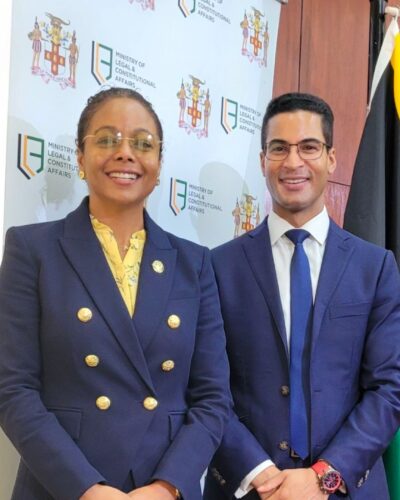
Texas Law global constitutional expert Richard Albert has seen his research relied upon numerous times in countries around the world reviewing or rewriting their constitutions. For example, in 2021, he advised the Constitutional Convention of Chile on designing procedures of constitutional reform for the country’s proposed constitution. And in 2022, the Supreme Court of Kenya relied extensively on his theory of constitutional dismemberment in its decision on a major dispute over a constitutional reform.
Now, Albert, the William Stamps Farish Professor in Law, as well as Professor of Government and Director of Constitutional Studies at UT Austin, will be helping Jamaica — the country where his parents met and his great-great-grandfather was born — in its transition from a constitutional monarchy to a republic.
Albert is one of 15 people appointed by Jamaican Prime Minister Andrew Holness and Minister of Legal & Constitutional Affairs Marlene Malahoo Forte to serve on the Constitution Reform Committee, or CRC, helping to lay the groundwork for a new governmental framework. He will continue to teach during this appointment, which is effective until the country’s planned elections in December 2025.
According to Albert, the CRC has three objectives. “One, to replace the King with a Jamaican Head of State,” says Albert. “Two, to modernize the country’s constitutional arrangements. And three, to patriate the Constitution – to bring it home, at last, from the United Kingdom.”
To accomplish that goal, the CRC is comprised of high-powered collection of government officials, political figures, academics, and civic leaders. All but one are Jamaicans; Albert, though of Jamaican descent, is the only foreigner to serve on the committee. The work of the committee will ultimately influence whether the country in fact transitions into a republic, a matter that will be decided in a national referendum.
“The people of Jamaica now have the historic opportunity to give themselves a new homegrown constitution that expresses their modern values,” said Albert. “Minister Malahoo Forte (the CRC’s chair) has designed a three-phase constitution-making process that reflects the democratic values of collaboration, consultation, and deliberation.”
Phase One, according to Forte in press reports, will “abolish the constitutional monarchy and establish the Republic of Jamaica and related matters.” Albert explains that the second phase will be a review of the wording and provisions of the Charter of Fundamental Rights and Freedoms, and that the final phase will be a full assessment of the nation’s legal and constitutional infrastructure to facilitate the drafting of a new constitution.
“I am delighted, but totally unsurprised, to see Professor Albert named to the Constitutional Reform Committee of Jamaica as an international constitutional expert,” noted Associate Dean for Research Melissa Wasserman. “Not only will his expertise help to move Jamaica towards a republican status, it will result in enriching our students, as professors at UT routinely bring their real-world experiences into the classroom.”
“My role is to draw from the vast global experience in constitution-making to offer options that will help the country satisfy its needs and achieve its highest aspirations,” Albert explained.
